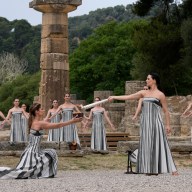 Judith Light, right, offers some insight to Jessica Hecht in “The Assembled Parties,” now playing through July 7 (www.theassembledpartiesbroadway.com).
Judith Light, right, offers some insight to Jessica Hecht in “The Assembled Parties,” now playing through July 7 (www.theassembledpartiesbroadway.com).
Credit: Joan Marcus
We interviewed third-time Tony Award nominee Judith Light about her current play, “The Assembled Parties,” as well as if the thrill of awards shows dims after her many successful years in onscreen and onstage (including her Tony win last year for Best Featured Actress in a Play for “Other Desert Cities”).
You’ve been to so many awards shows, you must be a pro at this.
I don’t feel like a pro at all; it’s every bit as exciting as it was the first time, I must say.
Do you know what you’re going to wear yet?
You know, those are the things that are a little bit harder for me because I have difficulty making decisions, but because I have some lovely people helping me that really makes a big difference. I don’t know that I can talk about it yet, because I haven’t asked permission.
How do you feel about your chances this year?
You really can’t compare any of the performances because they’re all so different. The women that have been nominated are all extraordinary, I think they’re amazing — and whichever one of us gets it isn’t important, what’s important is that we’ve come to celebrate each other. … A bunch of us have been talking about it, [the idea of] taking back competitiveness.
Like last year, you’re being recognized for playing an acerbic lush. Do you feel like you’re being typecast?
Well actually, I think they’re very different characters. [This one] is a woman from Long Island who is tortured by her circumstances and being cut off by her mother and is very jealous of her sister-in-law and then has this very profound transformation in the second act of the play. So I have to say no, I don’t know a lot about the typecast.
Is it a specific type of role that you like to play?
You know, I’m actually drawn to whatever characters I find really interesting and where I can really delve into pathologically and I try to find a depth in them that I can connect to that I know and understand and I want to investigate. And of course [you want to take it] when you have somebody as wonderful to work with as Richard Greenberg, who is one our greatest playwrights.
Your character changes a lot from her point of view in the first act and in the second act. Can you tell us a little about what motivates her?
What drives Faye in the first act is her need to express the depth of sorrow and pain and anger and loss that she feels in her life, and I think in the second act what she’s really expressing is the transformation that has occurred over the generosity of this amazing women [Hecht’s character] and what she said is. She’s lifted up by that and her whole life is different because this women has made such a difference in her life.
So there is this very sort of sour, angry, disappointed women in the first act. And in the second act, she’s literally lighter, as she says.
Do you relate to her reflections about the past, present and future?
That’s really interesting. I actually see that in my own life, I see that things can be lighter and better and that we can be given to by people and give to them and we can actually transform their lives. So I think that’s a really important message in the play — not only for the people that are seeing it, but for me in my life and for a lot of people that I know. I know it’s affected a lot of people in the cast and in the play as well.
Do you come from a very close-knit family?
No, we’re a very small family and we’re not terribly close. My parents are both gone, my dad just passed away last year.
So you don’t relate to the kinds of intimate family plays that you’ve been doing?
You know, I don’t very much. This is a very distinctive story, of course I bring myself and I bring some of my past — but it’s not really the prominent, sort of the high note for me in this. It’s such a brilliantly written piece that there’s so much that really has been given to us by Richard, so I’m really not bringing a lot of my family past in with me.
Do you think it’s a typical family dynamic, with everyone bickering and keeping secrets?
I feel that there’s this very interesting family that’s been created out of love and this desire to help each other and they become this kind of family that you would never expect when you see the beginning of this play. But they come together in a way that’s very unusual and that actually worked, and I think that there’s a lot of families in the world that comes together in this way and so it seems to me that it’s a very universal kind of message.
Do you think people can take that away from the play? That they can choose their family and make amends coming forward?
I think that’s one of the biggest messages of this play, I think that’s why audiences are responding to it the way that they are because they see something of it in themselves. And even though it’s a Jewish family, we hear from so many perspectives that it comes out that there are all kinds of families and all kinds of possibilities out there.
Follow T. Michelle Murphy on Twitter: @TMichelleMurphy













